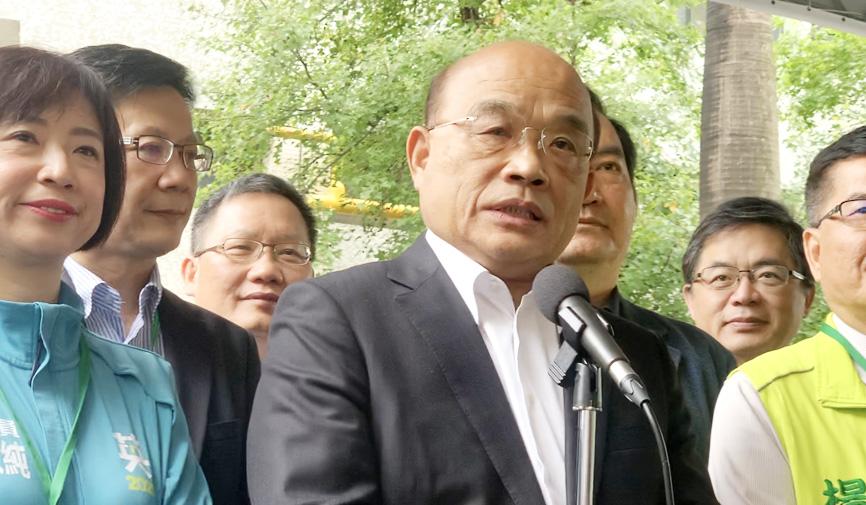Premier Su Tseng-chang (蘇貞昌) yesterday said that the public is likely unimpressed with Minister of the Interior Hsu Kuo-yung (徐國勇) on Friday asking prosecutors to investigate National Police Agency (NPA) Director-General Chen Ja-chin (陳家欽) over three promotions he approved. Su called on Chen to continue serving in his position steadfastly while waiting for the judiciary to prove his innocence.
Hsu had forwarded a case involving Chen, NPA Department of Human Resources Director Chang Shu-fang (張淑芳), as well as NPA Director-General’s Office coordinators Wu Cheng-chieh (吳正杰), Chu Cheng-tzu (渠正慈) and Wang Wen-chu (王文助), to the Taipei District Prosecutors’ Office.
The Ministry of the Interior said that Chen unduly expedited the promotions of Wu, Chu and Wang to their current posts, despite the agency having announced that the candidates would be selected by an open audition.

Photo: Tsai Shu-yuan, Taipei Times
The ministry in its complaint accused Chen of instructing Chang to abet the three in writing false reports about their positions and the exchanges they had as officers to allegedly help them secure the promotions to police officer rank 1, characterized by two bars and four stars, which they would otherwise have had to wait for another five to six years to attain.
Although the prosecutors’ office later on Friday rejected the case citing procedural flaws, it is still under investigation by the Control Yuan and the Agency Against Corruption.
The incident has sparked widespread speculation of a power struggle between Chen and Hsu over the NPA’s staffing.
Asked about the issue, Chen said that all of his actions have been completely legitimate and would withstand public scrutiny.
Su yesterday said he was dismayed by the incident, adding that the public is likely confused and unimpressed by the kerfuffle, especially amid fears over COVID-19.
Su added that the ministry did not inform his aide of the matter until after 8pm on Friday.
Hsu should have spoken to him if he believed that Chen was unfit for his job, so that he could replace or transfer Chen, Su said, but added that Hsu had never spoken to him about the issue.
Hsu claimed to have been too busy to report on the matter, Su said, only to text him the following day saying that he was reticent over the case because he did not want it to follow a direction similar to 2013’s Legislative Yuan wiretapping case implicating then-prosecutor-general Huang Shih-ming (黃世銘) in leaking information from a judicial investigation to then-president Ma Ying-jeou (馬英九).
However, the ministry’s news release on Friday night conflicted with Hsu’s remarks, saying that it had withheld information to ensure the integrity of the government’s ethics system, Su said.
The principle of secret investigation does not apply to the ministry’s Department of Civil Service Ethics, which is not part of the judicial system, he added.

NATIONAL SECURITY THREAT: An official said that Guan Guan’s comments had gone beyond the threshold of free speech, as she advocated for the destruction of the ROC China-born media influencer Guan Guan’s (關關) residency permit has been revoked for repeatedly posting pro-China content that threatens national security, the National Immigration Agency said yesterday. Guan Guan has said many controversial things in her videos posted to Douyin (抖音), including “the red flag will soon be painted all over Taiwan” and “Taiwan is an inseparable part of China,” while expressing hope for expedited “reunification.” The agency received multiple reports alleging that Guan Guan had advocated for armed reunification last year. After investigating, the agency last month issued a notice requiring her to appear and account for her actions. Guan Guan appeared as required,

A strong cold air mass is expected to arrive tonight, bringing a change in weather and a drop in temperature, the Central Weather Administration (CWA) said. The coldest time would be early on Thursday morning, with temperatures in some areas dipping as low as 8°C, it said. Daytime highs yesterday were 22°C to 24°C in northern and eastern Taiwan, and about 25°C to 28°C in the central and southern regions, it said. However, nighttime lows would dip to about 15°C to 16°C in central and northern Taiwan as well as the northeast, and 17°C to 19°C elsewhere, it said. Tropical Storm Nokaen, currently

‘NATO-PLUS’: ‘Our strategic partners in the Indo-Pacific are facing increasing aggression by the Chinese Communist Party,’ US Representative Rob Wittman said The US House of Representatives on Monday released its version of the Consolidated Appropriations Act, which includes US$1.15 billion to support security cooperation with Taiwan. The omnibus act, covering US$1.2 trillion of spending, allocates US$1 billion for the Taiwan Security Cooperation Initiative, as well as US$150 million for the replacement of defense articles and reimbursement of defense services provided to Taiwan. The fund allocations were based on the US National Defense Authorization Act for fiscal 2026 that was passed by the US Congress last month and authorized up to US$1 billion to the US Defense Security Cooperation Agency in support of the

PAPERS, PLEASE: The gang exploited the high value of the passports, selling them at inflated prices to Chinese buyers, who would treat them as ‘invisibility cloaks’ The Yilan District Court has handed four members of a syndicate prison terms ranging from one year and two months to two years and two months for their involvement in a scheme to purchase Taiwanese passports and resell them abroad at a massive markup. A Chinese human smuggling syndicate purchased Taiwanese passports through local criminal networks, exploiting the passports’ visa-free travel privileges to turn a profit of more than 20 times the original price, the court said. Such criminal organizations enable people to impersonate Taiwanese when entering and exiting Taiwan and other countries, undermining social order and the credibility of the nation’s